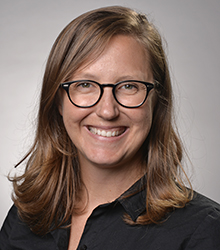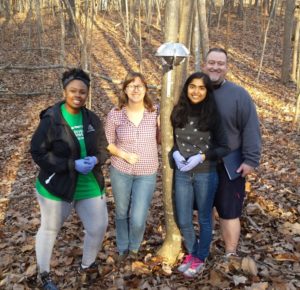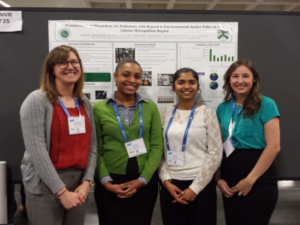Faculty Spotlight: Kathryn Zimmermann
For the Fall 2020 Faculty spotlight, the GGC Chemistry Division would like to recognize the contributions of Dr. Kathryn Zimmermann, Assistant Professor of Chemistry, and recipient of the Fall 2020 GGC Scholarship & Creative Activities Award and the 2019 Top Claw Award.
Dr. Zimmermann has been with GGC since 2015. Prior to accepting a position at GGC, she had received her Bachelor’s degree in Chemistry with a Math minor from James Madison University. As an undergraduate student, she had the opportunity to conduct research in materials, focusing on monomer films, but her interest changed to environmental chemistry after taking a course in the subject. This interest led her to University of California, Riverside, where she completed her Ph.D. in Environmental Toxicology in 2012. This was followed by a Post-doc at UC San Diego, where she studied cloud condensation nuclei from particulates and instrument development. These combined research efforts led to the publication of 8 papers in various journals, including Environmental Science and Technology, Langmuir, and Atmospheric Environment.
 After arriving at GGC, Dr. Zimmermann assumed responsibility for an ICP-MS that had been recently acquired by Dr. Pursell for the Chemistry Division. She subsequently developed several undergraduate environmental/analytical research projects centering on the use of ICP-MS to detect trace elements. The first of these, ICP-MS analysis of biodiesel for heavy metal content, involved several GGC faculty and students researching the production of biodiesel fuel from waste oils. A second project, related to her previous research, involved single particle characterization of marine aerosols using atomic force microscopy to evaluate particle morphology. Her most recent project involves gas-phase passive air sampling of polyaromatic hydrocarbons (PAHs) in the Atlanta metropolitan region. PAHs, which are mutagenic and carcinogenic, are hazardous air pollutants produced from burning organic materials, among other sources. Dr. Zimmermann maintains a collection of passive air sampling traps that adsorb pollutants onto a foam surface. She then collects the traps to sample rate of deposition of PAHs, compare results with EPA methods, and compare data from rural vs. urban sampling locations. As part of these projects she has mentored more than 15 undergraduate research students, published a research paper on the characterization of biodiesel fuel produced from restaurant cooking waste with undergraduate student authors, published an educational paper on a laboratory course transition to online during COVID-19, and co-authored several ACS symposium series chapters. Additionally, she played a key role in the acquisition of over $200,000 in external NSF funding for major instrumentation grants at GGC, and has received multiple funding awards, including internal mini-grants from GGC, for student-centered research projects. She has been an invited speaker at the 2019 SERMACS meeting, and the 2019 Herty Symposium, among others.
After arriving at GGC, Dr. Zimmermann assumed responsibility for an ICP-MS that had been recently acquired by Dr. Pursell for the Chemistry Division. She subsequently developed several undergraduate environmental/analytical research projects centering on the use of ICP-MS to detect trace elements. The first of these, ICP-MS analysis of biodiesel for heavy metal content, involved several GGC faculty and students researching the production of biodiesel fuel from waste oils. A second project, related to her previous research, involved single particle characterization of marine aerosols using atomic force microscopy to evaluate particle morphology. Her most recent project involves gas-phase passive air sampling of polyaromatic hydrocarbons (PAHs) in the Atlanta metropolitan region. PAHs, which are mutagenic and carcinogenic, are hazardous air pollutants produced from burning organic materials, among other sources. Dr. Zimmermann maintains a collection of passive air sampling traps that adsorb pollutants onto a foam surface. She then collects the traps to sample rate of deposition of PAHs, compare results with EPA methods, and compare data from rural vs. urban sampling locations. As part of these projects she has mentored more than 15 undergraduate research students, published a research paper on the characterization of biodiesel fuel produced from restaurant cooking waste with undergraduate student authors, published an educational paper on a laboratory course transition to online during COVID-19, and co-authored several ACS symposium series chapters. Additionally, she played a key role in the acquisition of over $200,000 in external NSF funding for major instrumentation grants at GGC, and has received multiple funding awards, including internal mini-grants from GGC, for student-centered research projects. She has been an invited speaker at the 2019 SERMACS meeting, and the 2019 Herty Symposium, among others.
Dr. Zimmermann is currently looking into the acquisition of a new ICP-MS for research activities at GGC,  is a member of several Instrumentation Committees, and works with students to present their research through posters and oral presentations at local and regional conferences, including GGC CREATE, STaRS, and STEM symposia. Several of her former students have graduated from GGC and accepted positions in industry, including Bako Diagnostics, and one of her students recently completed a Master’s degree in Bioinformatics from Northeastern University.
is a member of several Instrumentation Committees, and works with students to present their research through posters and oral presentations at local and regional conferences, including GGC CREATE, STaRS, and STEM symposia. Several of her former students have graduated from GGC and accepted positions in industry, including Bako Diagnostics, and one of her students recently completed a Master’s degree in Bioinformatics from Northeastern University.
Congratulations, Dr. Zimmermann for your outstanding research and service to the students at GGC!
You must be logged in to post a comment.